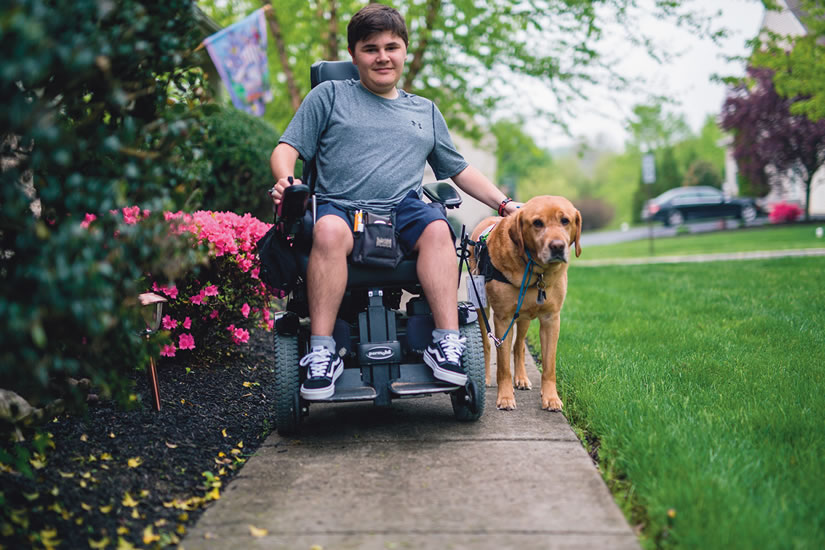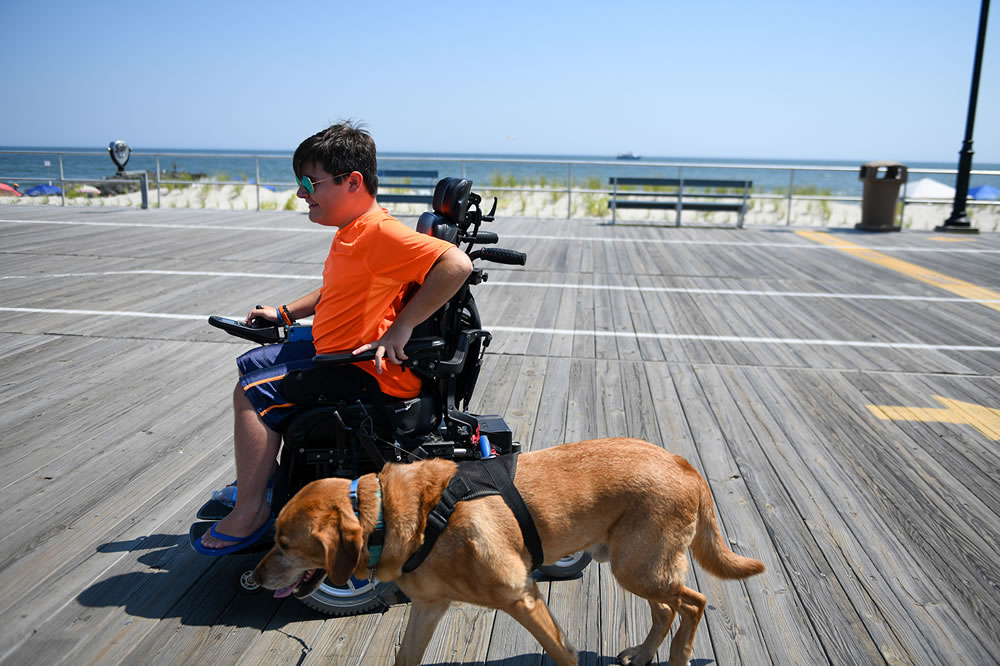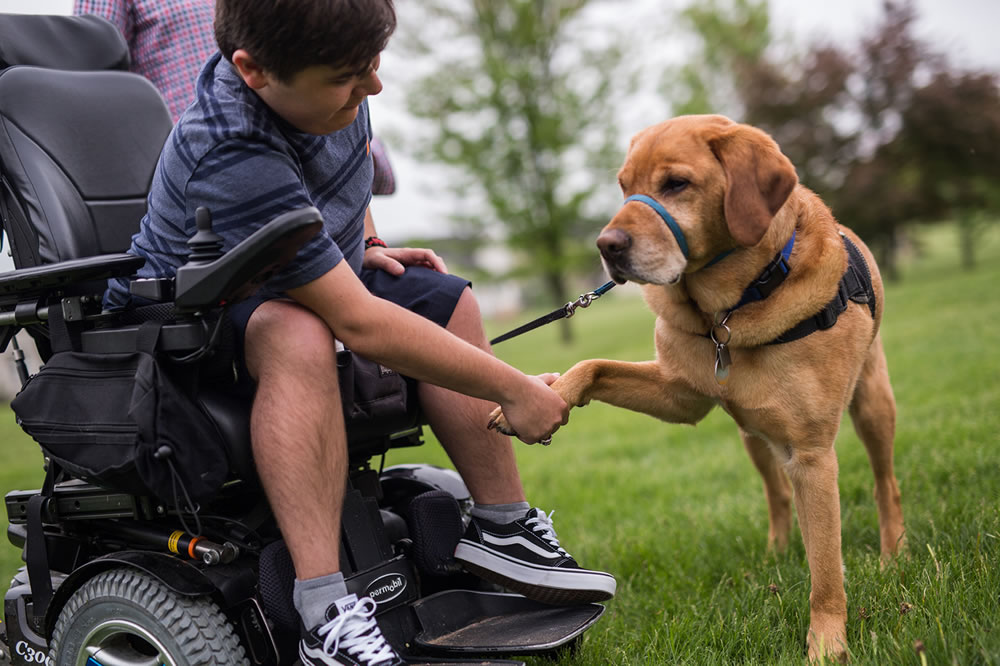Illuminating Unseen Dimensions
No Is Not an Answer
Rather than holding him back, DMD is driving Jordan Reidenberg to find a more accessible world.

In a small town outside of Philadelphia, 18-year-old Jordan Ridenberg and his loyal furry companion, Jolly, stroll about the manicured neighborhood, taking a break from chores and schoolwork. Spring has arrived and melted the snow, which means Jordan can freely maneuver his wheelchair anywhere and everywhere. He swims at the local YMCA, goes to the movies with friends, and recently attended high school prom. In many ways, he is an average soon-to-be high school senior. His challenge: He lives with Duchenne muscular dystrophy (DMD), a genetic disorder characterized by progressive muscle degeneration and weakness.
“The only reason that I’m not healthy,” Jordan says, “is because of Duchenne.” Then, with his signature sense of youthful humor, he adds, “It’s just this one thing that’s a pain in the butt!”
When Jordan was a young boy, his parents noticed that he walked differently than his siblings.
“He became a ‘toe-walker,’” says his father, Seth, rising up on his feet to demonstrate the way Jordan would walk on the balls of his feet and not his heels. “Later, we realized [he walked this way] because his heel cords had become shorter, as they do with Duchenne.”
When Jordan’s parents noticed that his younger sister bounded up the stairs noticeably faster than he did, they took him to physical therapy. The therapist recommended a neurologist to administer further testing. Tests revealed heightened creatine kinase (CK) levels, which necessitated genetic testing. A genetic mutation was found, and at 6 years old, Jordan was diagnosed with DMD. What his parents thought was a simple problem with walking suddenly turned into a lifelong progressive and debilitating disease. Seth and Regina sat stunned in the geneticist’s office.
“It was a crushing blow,” Seth says. “The doctor simply said, ‘This is what he’s got and there’s nothing you can do about it. Just enjoy your time with him.’” They left with that statement ringing in their ears.
Finding a place to belong
They needed some kind of help, but what was out there as far as treatments and support? They found Parent Project Muscular Dystrophy (PPMD), a parent-led patient organization fighting to end DMD. Synchronistically, PPMD was three weeks away from hosting its annual conference in Philadelphia. In a time of darkness and worry, PPMD provided a beacon of light.

"I remember thinking, ‘There is hope,’” Seth says. He and Regina walked into the conference hall. It was larger than they had imagined, and it was packed with people. Boys at every stage of Duchenne were present — boys who could still run, those who were struggling to walk, and others zipping around in powerchairs. Seth and Regina were at once overwhelmed and inspired. Here they would learn crucial information to help their son, they would forge lifelong friendships, build community, and learn about advocacy. The conference provided endless opportunities. The question was, where to begin.
Two brothers, Elliot and Henry, who both had Duchenne, welcomed Jordan into a conversation. That was the first time he had met others who shared the same genetic condition as him, and they had so much to share with each other. Fortuitously, the brothers lived just a half-hour away, and over the years, Jordan frequently visited their house to hang out and in the summers to swim. They witnessed each other’s bodies change, Elliot and Henry’s muscle degeneration always a step ahead of Jordan’s.
“With them, I felt less isolated,” Jordan explains. As his body changed and he moved into a wheelchair, he knew the one place he didn’t need to feel self-conscious was with them.
With a desire for more comfortable social outlets, Jordan decided to attend MDA Summer Camp, a place where kids like him are enabled to participate in all activities without physical or social barriers. He was 13 when he went away for the first time. That first day, he nervously maneuvered toward his bunkmates, all boys in wheelchairs with differing levels of physical ability. They were excited to meet him and, equally as important, nobody stared at him or questioned his capabilities.
Camp was a place where kids could spend time in fresh air, away from the distractions of their everyday lives. Jordan was delighted that many of the limitations he encountered in his everyday life didn’t exist here. Everybody did it all: art projects, swimming, archery, bonfires, and of course, hanging out in the cabins with bunkmates and counselors.
“Camp was also a good way to learn to be more mature because I got to be with older kids and counselors who all have different outlooks on life,” Jordan says. The role models at camp taught Jordan to see the world as full of possibilities rather than barriers.
“Camp definitely helped me become who I am today,” he says. “It’s more comfortable to open up to people who you share similarities with. Camp has made me more confident socially because I am included. I look back now and see that I was really shy when I started.” Inclusivity is paramount, and has transformed Jordan’s viewpoint on how he approaches the challenges that come with Duchenne. “Going to camp showed me that I’m in a lot better shape than I may think I am,” he says. “But regardless, we’re all just kids you know? It's a very good experience getting to know the people there, hearing their stories and how they work to overcome adversity.”
Another friend, and future goals
Jordan reaches his hand down to give Jolly a playful pet on his head. Jolly is a 2-year-old, 80-pound golden labrador who Regina found through Canine Partners for Life, a nonprofit organization dedicated to training service dogs for people with disabilities. Once the family made the decision to get a service dog, the two-year waitlist felt like an eternity. On the day Regina received an email saying Jordan had been matched with a dog, Jordan’s eyes lit up with excitement. Jordan and his mother walked into the canine center anxious with enthusiasm, and there stood Jolly, with big, sweet eyes and a wagging tail.
“There were lots of other people there also meeting their dogs for the first time,” Jordan says. “I think Jolly was probably nervous, too, because it was new for him.”

Jolly didn't come home with Jordan until the fifth day of training. About halfway through the training, Jordan’s and Jolly’s nerves subsided, and through the partner exercises and trainings they were led through, they built trust and confidence together. Quickly, they became buddies.
“We kind of just clicked,” Jordan says. “We’re a good match. We work well together.”
Jolly relaxes on the floor by Jordan’s wheelchair. Jordan puts on Jolly’s work vest and head collar, delicately lifting the collar over Jolly’s head and snout. Immediately Jolly sits up, with a serious face, ready for command. Like a dog with two different personalities, he knows when he is at work, and when he isn’t. “Sometimes he’s stubborn,” Jordan says with a laugh, “but he still does what I ask him. He’s just like everybody else — he doesn’t want to go to work in the morning.”
This summer, Jordan looks forward to learning how to drive a car, hopefully acquiring his license and the funds for a hand-operated vehicle. “I don’t want to take no for an answer, so I won't,” he says. “We just have to figure it out.” Driving would give Jordan the ability to go to the movies, to see friends, to get space from his younger siblings, and to gain the independence for which all teenagers long. More than anything, Jordan desires access and inclusion.
Ultimately, Jordan’s attitude is one of gratitude.
“I try to be an example for people, because there’s always someone who is going through something worse,” he says. He values his sense of humor and being a source of motivation for others. “I'm meant to be a role model,” he says. “To show people how to overcome hardship, and how to persevere through. It’s a big problem now — people don't know how to handle hard situations.”
Jordan envisions himself as a speaker on a panel.
“You can use your energy to positively impact and influence,” he explains. “But if you’re negative all the time, it affects your health.”
After finishing high school, Jordan looks forward to attending college. He is interested in both the University of Arizona and the University of Florida, which are celebrated for having exceptional accessible campuses. The University of Florida has state-of-the-art infrastructure, housing other students with Duchenne, who live with their service animals in an accessible dorm. This is exciting to him as it opens possibilities of access.
“Duchenne hinders my ability to meet new people only because it's harder for me to go places,” Jordan says. “With that accessibility, it will be a lot easier.” Jordan is most interested in studying business, engineering, or landscape architecture. With his “adapt-and-conquer” attitude, he is poised to make his dreams a reality. For now, he sits in the living room with Jolly by his side and tries not to think of all the homework he has to finish before the weekend ends.